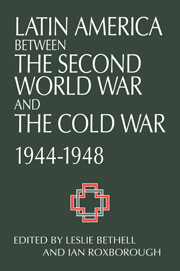Book contents
- Frontmatter
- Contents
- List of contributors
- Preface
- Introduction: The postwar conjuncture in Latin America: democracy, labor, and the Left
- 1 Brazil
- 2 Chile
- 3 Argentina
- 4 Bolivia
- 5 Venezuela
- 6 Peru
- 7 Mexico
- 8 Cuba
- 9 Nicaragua
- 10 Costa Rica
- 11 Guatemala
- Conclusion: The postwar conjuncture in Latin America and its consequences
- Index
3 - Argentina
Published online by Cambridge University Press: 04 May 2010
- Frontmatter
- Contents
- List of contributors
- Preface
- Introduction: The postwar conjuncture in Latin America: democracy, labor, and the Left
- 1 Brazil
- 2 Chile
- 3 Argentina
- 4 Bolivia
- 5 Venezuela
- 6 Peru
- 7 Mexico
- 8 Cuba
- 9 Nicaragua
- 10 Costa Rica
- 11 Guatemala
- Conclusion: The postwar conjuncture in Latin America and its consequences
- Index
Summary
The 1929 world crisis had an impact on Argentina different in many aspects from the rest of Latin America. The reasons for this can be found not only in the specific effect of the crisis itself on the Argentine economy and society but also in the changes that had occurred in Argentina's political system and in Argentina's international relations since the First World War.
In 1916 the leader of the Partido Radical (PR), Hipolito Yrigoyen, became president in the first truly democratic elections in Argentine history, putting an end to the succession of ideologically liberal but oligarchic governments that had run the country since the mid-nineteenth century. In September 1930, however, a coup d'etat led by General Jose Felix Uriburu led to the restoration of the old conservative oligarchy to power. Thus in Argentina in the 1930s the process of import substitution industrialization did not occur within the framework of democratic or populist politics as in many Latin American countries, but under the auspices of conservative governing elites and a repressive, authoritarian political regime, even though democratic institutions were formally preserved.
Although the essentially agro-export structure of Argentina's economy had not changed, since the First World War a triangular system of foreign trade had been established whose major axes were the United States, the major exporter of goods to Argentina, and Great Britain, the major importer of Argentine goods, and increasingly the United States had displaced Britain in the financial field.
- Type
- Chapter
- Information
- Latin America between the Second World War and the Cold WarCrisis and Containment, 1944–1948, pp. 92 - 119Publisher: Cambridge University PressPrint publication year: 1993
- 1
- Cited by

